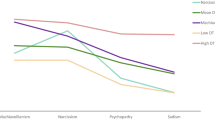Abstract
A sample of 991 male clergy affiliated with the Evangelical Alliance in the United Kingdom completed the short-form Revised Eysenck Personality Questionnaire, together with a question regarding the practice of glossolalia. The data demonstrated that glossolalia was correlated positively with extraversion, correlated negatively with neuroticism, and unrelated to psychoticism. Glossolalia was associated with stable extraversion, and contrary to some theories, completely unrelated to psychopathology.
Similar content being viewed by others
References
Castelein, J.D. (1984). Glossolalia and the psychology of the self and narcissism. Journal of Religion and Health, 23, 47–62.
Coulson, J. E. & Johnson, R.W. (1977). Glossolalia and internal-external locus of control. Journal of Psychology and Theology, 5, 312–17.
Cutten, G.B. (1927). Speaking with tongues: Historically and psychologically considered. Yale: Yale University Press.
Eysenck, H.J., & Eysenck, M.W. (1985). Personality and individual differences: A natural science approach. New York: Plenum Press.
Eysenck, H.J., & Eysenck, S.B.G. (1975). Manual of the Eysenck Personality Questionnaire (adult and junior). London: Hodder and Stoughton.
Eysenck, S.B.G., Eysenck, H. J., & Barrett, P. (1985). A revised version of the psychoticism scale. Personality and Individual Differences, 6, 21–29.
Francis, L.J., & Jones, S.H. (1997). Personality and charismatic experience among adult Christians. Pastoral Psychology, 45, 421–428.
Francis, L.J., & Kay, W.K. (1995). The personality characteristics of Pentecostal ministry candidates. Personality and Individual Differences, 18, 581–594.
Francis, L.J., & Thomas, T.H. (1997). Are charismatic ministers less stable? A study among male Anglican clergy. Review of Religious Research, 39, 61–69.
Gritzmacher, S.A., Bolton, B., & Dana, R.H. (1988). Psychological characteristics of Pentecostals: A literature review and psychodynamic synthesis. Journal of Psychology and Theology, 16, 233–245.
Kelsey, M.T. (1964). Tongue speaking: An experiment in spiritual experience. Garden City, New York: Doubleday.
Kildahl, J.P. (1972). The Psychology of speaking in tongues, London: Hodder and Stoughton.
Kildahl, J.P. (1975). Psychological observations. In M.P. Hamilton (Ed.), The Charismatic movement. (pp 124–142). Grand Rapids: Eerdmans.
Lapsley, J.N., & Simpson, J.H. (1964). Speaking in tongues: Infantile babble or song of the self. Pastoral Psychology, 15, 16–24, 48–55.
Louden, S.H., & Francis L.J. (2001). Are Catholic priests in England and Wales attracted to the charismatic movement emotionally less stable? British Journal of Theological Education, 11, 65–76.
Lovekin, A.A., & Malony, H.N. (1977). Religious glossolalia: A longitudinal study of personality changes. Journal for the Scientific Study of Religion, 16, 383–393.
Mackie, A. (1921). The gift of tongues. New York: G. H. Doran.
Neisz, N.L., & Kronenberger, E.J. (1978). Self-actualization in glossolalic and non-glossolalic Pentecostals. Sociological Analysis, 39, 250–256.
Ness, R.C., & Wintrob, R.M. (1980). The emotional impact of fundamentalist religious participation: An empirical study of intragroup variation. American Journal of Orthopsychiatry, 50, 302–315.
Pattison, E M. (1968). Behavioral science research on the nature of glossolalia. Journal of American Scientific Affiliation, 20, 73–86.
Robbins, M., Hair, J., & Francis, L.J. (1999). Personality and attraction to the charismatic movement: A study among Anglican clergy. Journal of Beliefs and Values, 20, 239–246.
Smith, D.S., & Fleck, J.R. (1981). Personality correlates of conventional and unconventional glossolalia. Journal of Social Psychology, 114, 209–217.
SPSS Inc (1988). SPSSX user's guide. New York: McGraw-Hill.
Tappeiner, D.A. (1974). The function of tongue-speaking for the individual: A psycho-theological model. Journal of American Scientific Affiliation, 26, 29–32.
Vivier, L. M. (1960). Glossolalia, Unpublished doctoral dissertation, University of Witwatersrand.
Williams, C.G. (1981). Tongues of the Spirit: A study of Pentecostal glossolalia and related phenomena. Cardiff: University of Wales Press.
Author information
Authors and Affiliations
Rights and permissions
About this article
Cite this article
Francis, L.J., Robbins, M. Personality and Glossolalia: A Study Among Male Evangelical Clergy. Pastoral Psychology 51, 391–396 (2003). https://doi.org/10.1023/A:1023618715407
Issue Date:
DOI: https://doi.org/10.1023/A:1023618715407




